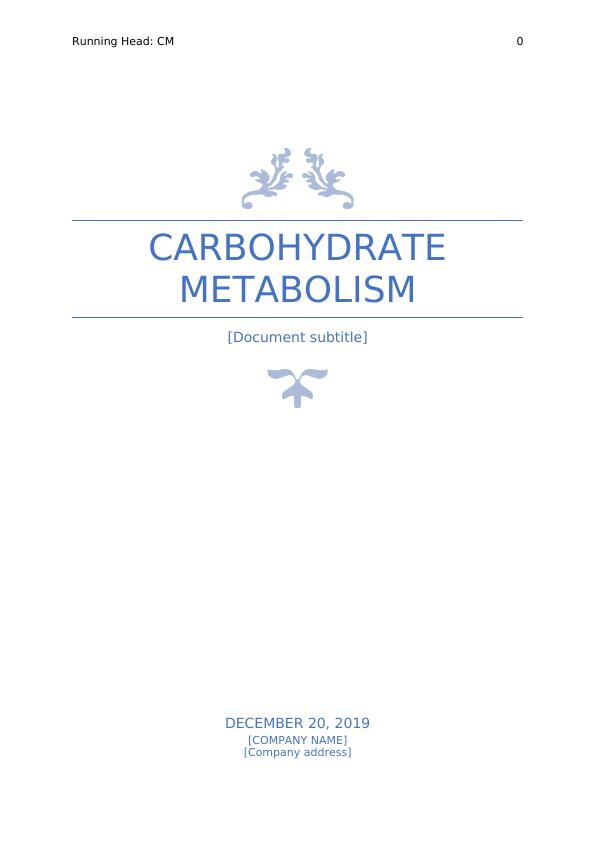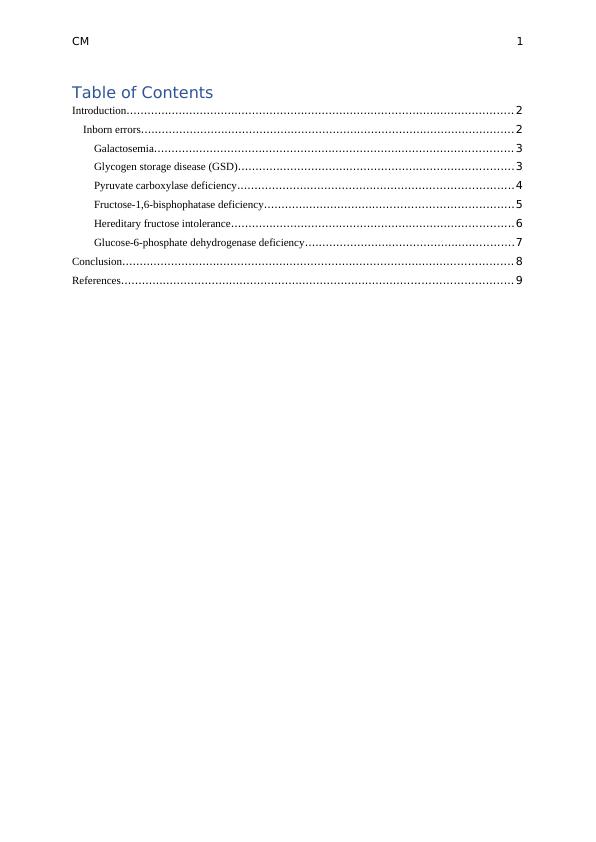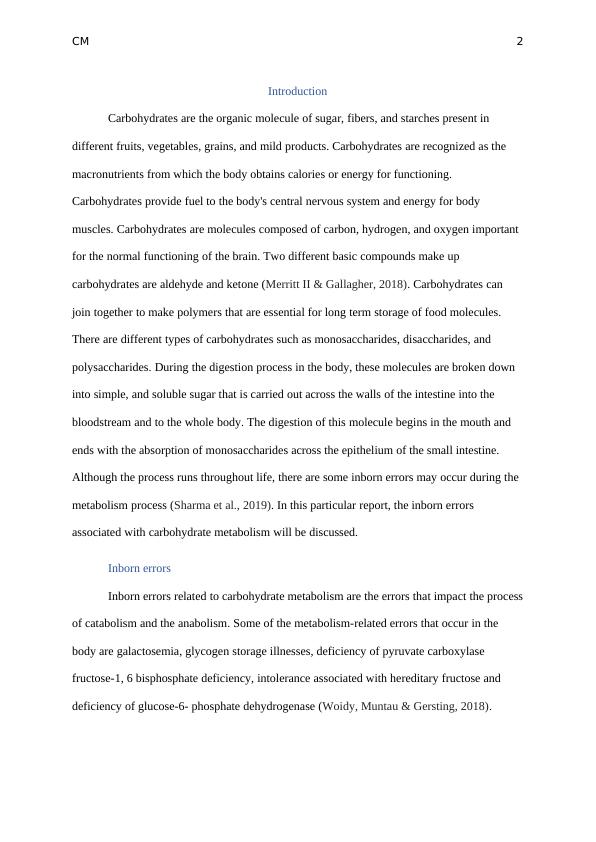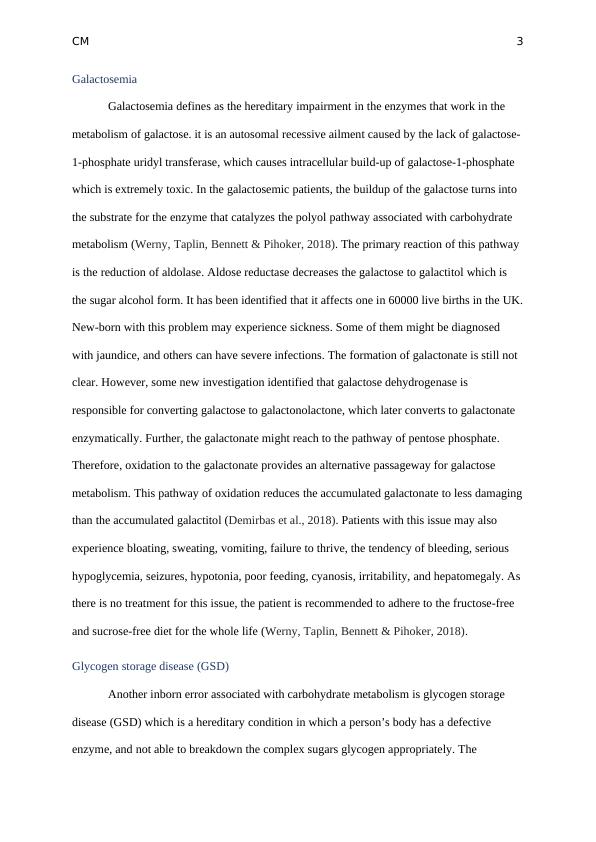CM 2 Carbohydrate Metabolism
Added on 2022-09-09
12 Pages3301 Words11 Views
Running Head: CM 0
CARBOHYDRATE
METABOLISM
[Document subtitle]
DECEMBER 20, 2019
[COMPANY NAME]
[Company address]
CARBOHYDRATE
METABOLISM
[Document subtitle]
DECEMBER 20, 2019
[COMPANY NAME]
[Company address]

CM 1
Table of Contents
Introduction............................................................................................................... 2
Inborn errors........................................................................................................... 2
Galactosemia....................................................................................................... 3
Glycogen storage disease (GSD)............................................................................... 3
Pyruvate carboxylase deficiency...............................................................................4
Fructose-1,6-bisphophatase deficiency.......................................................................5
Hereditary fructose intolerance.................................................................................6
Glucose-6-phosphate dehydrogenase deficiency............................................................7
Conclusion................................................................................................................ 8
References................................................................................................................ 9
Table of Contents
Introduction............................................................................................................... 2
Inborn errors........................................................................................................... 2
Galactosemia....................................................................................................... 3
Glycogen storage disease (GSD)............................................................................... 3
Pyruvate carboxylase deficiency...............................................................................4
Fructose-1,6-bisphophatase deficiency.......................................................................5
Hereditary fructose intolerance.................................................................................6
Glucose-6-phosphate dehydrogenase deficiency............................................................7
Conclusion................................................................................................................ 8
References................................................................................................................ 9

CM 2
Introduction
Carbohydrates are the organic molecule of sugar, fibers, and starches present in
different fruits, vegetables, grains, and mild products. Carbohydrates are recognized as the
macronutrients from which the body obtains calories or energy for functioning.
Carbohydrates provide fuel to the body's central nervous system and energy for body
muscles. Carbohydrates are molecules composed of carbon, hydrogen, and oxygen important
for the normal functioning of the brain. Two different basic compounds make up
carbohydrates are aldehyde and ketone (Merritt II & Gallagher, 2018). Carbohydrates can
join together to make polymers that are essential for long term storage of food molecules.
There are different types of carbohydrates such as monosaccharides, disaccharides, and
polysaccharides. During the digestion process in the body, these molecules are broken down
into simple, and soluble sugar that is carried out across the walls of the intestine into the
bloodstream and to the whole body. The digestion of this molecule begins in the mouth and
ends with the absorption of monosaccharides across the epithelium of the small intestine.
Although the process runs throughout life, there are some inborn errors may occur during the
metabolism process (Sharma et al., 2019). In this particular report, the inborn errors
associated with carbohydrate metabolism will be discussed.
Inborn errors
Inborn errors related to carbohydrate metabolism are the errors that impact the process
of catabolism and the anabolism. Some of the metabolism-related errors that occur in the
body are galactosemia, glycogen storage illnesses, deficiency of pyruvate carboxylase
fructose-1, 6 bisphosphate deficiency, intolerance associated with hereditary fructose and
deficiency of glucose-6- phosphate dehydrogenase (Woidy, Muntau & Gersting, 2018).
Introduction
Carbohydrates are the organic molecule of sugar, fibers, and starches present in
different fruits, vegetables, grains, and mild products. Carbohydrates are recognized as the
macronutrients from which the body obtains calories or energy for functioning.
Carbohydrates provide fuel to the body's central nervous system and energy for body
muscles. Carbohydrates are molecules composed of carbon, hydrogen, and oxygen important
for the normal functioning of the brain. Two different basic compounds make up
carbohydrates are aldehyde and ketone (Merritt II & Gallagher, 2018). Carbohydrates can
join together to make polymers that are essential for long term storage of food molecules.
There are different types of carbohydrates such as monosaccharides, disaccharides, and
polysaccharides. During the digestion process in the body, these molecules are broken down
into simple, and soluble sugar that is carried out across the walls of the intestine into the
bloodstream and to the whole body. The digestion of this molecule begins in the mouth and
ends with the absorption of monosaccharides across the epithelium of the small intestine.
Although the process runs throughout life, there are some inborn errors may occur during the
metabolism process (Sharma et al., 2019). In this particular report, the inborn errors
associated with carbohydrate metabolism will be discussed.
Inborn errors
Inborn errors related to carbohydrate metabolism are the errors that impact the process
of catabolism and the anabolism. Some of the metabolism-related errors that occur in the
body are galactosemia, glycogen storage illnesses, deficiency of pyruvate carboxylase
fructose-1, 6 bisphosphate deficiency, intolerance associated with hereditary fructose and
deficiency of glucose-6- phosphate dehydrogenase (Woidy, Muntau & Gersting, 2018).

CM 3
Galactosemia
Galactosemia defines as the hereditary impairment in the enzymes that work in the
metabolism of galactose. it is an autosomal recessive ailment caused by the lack of galactose-
1-phosphate uridyl transferase, which causes intracellular build-up of galactose-1-phosphate
which is extremely toxic. In the galactosemic patients, the buildup of the galactose turns into
the substrate for the enzyme that catalyzes the polyol pathway associated with carbohydrate
metabolism (Werny, Taplin, Bennett & Pihoker, 2018). The primary reaction of this pathway
is the reduction of aldolase. Aldose reductase decreases the galactose to galactitol which is
the sugar alcohol form. It has been identified that it affects one in 60000 live births in the UK.
New-born with this problem may experience sickness. Some of them might be diagnosed
with jaundice, and others can have severe infections. The formation of galactonate is still not
clear. However, some new investigation identified that galactose dehydrogenase is
responsible for converting galactose to galactonolactone, which later converts to galactonate
enzymatically. Further, the galactonate might reach to the pathway of pentose phosphate.
Therefore, oxidation to the galactonate provides an alternative passageway for galactose
metabolism. This pathway of oxidation reduces the accumulated galactonate to less damaging
than the accumulated galactitol (Demirbas et al., 2018). Patients with this issue may also
experience bloating, sweating, vomiting, failure to thrive, the tendency of bleeding, serious
hypoglycemia, seizures, hypotonia, poor feeding, cyanosis, irritability, and hepatomegaly. As
there is no treatment for this issue, the patient is recommended to adhere to the fructose-free
and sucrose-free diet for the whole life (Werny, Taplin, Bennett & Pihoker, 2018).
Glycogen storage disease (GSD)
Another inborn error associated with carbohydrate metabolism is glycogen storage
disease (GSD) which is a hereditary condition in which a person’s body has a defective
enzyme, and not able to breakdown the complex sugars glycogen appropriately. The
Galactosemia
Galactosemia defines as the hereditary impairment in the enzymes that work in the
metabolism of galactose. it is an autosomal recessive ailment caused by the lack of galactose-
1-phosphate uridyl transferase, which causes intracellular build-up of galactose-1-phosphate
which is extremely toxic. In the galactosemic patients, the buildup of the galactose turns into
the substrate for the enzyme that catalyzes the polyol pathway associated with carbohydrate
metabolism (Werny, Taplin, Bennett & Pihoker, 2018). The primary reaction of this pathway
is the reduction of aldolase. Aldose reductase decreases the galactose to galactitol which is
the sugar alcohol form. It has been identified that it affects one in 60000 live births in the UK.
New-born with this problem may experience sickness. Some of them might be diagnosed
with jaundice, and others can have severe infections. The formation of galactonate is still not
clear. However, some new investigation identified that galactose dehydrogenase is
responsible for converting galactose to galactonolactone, which later converts to galactonate
enzymatically. Further, the galactonate might reach to the pathway of pentose phosphate.
Therefore, oxidation to the galactonate provides an alternative passageway for galactose
metabolism. This pathway of oxidation reduces the accumulated galactonate to less damaging
than the accumulated galactitol (Demirbas et al., 2018). Patients with this issue may also
experience bloating, sweating, vomiting, failure to thrive, the tendency of bleeding, serious
hypoglycemia, seizures, hypotonia, poor feeding, cyanosis, irritability, and hepatomegaly. As
there is no treatment for this issue, the patient is recommended to adhere to the fructose-free
and sucrose-free diet for the whole life (Werny, Taplin, Bennett & Pihoker, 2018).
Glycogen storage disease (GSD)
Another inborn error associated with carbohydrate metabolism is glycogen storage
disease (GSD) which is a hereditary condition in which a person’s body has a defective
enzyme, and not able to breakdown the complex sugars glycogen appropriately. The

End of preview
Want to access all the pages? Upload your documents or become a member.
Related Documents
Hereditary Fructose Intolerance: Reasons for Inability to Metabolize Fructoselg...
|7
|1616
|488
Nutritional Biochemistry and Physiology - Hereditary Fructose Intolerance and Mutagenesis Agentslg...
|7
|1390
|356
Biomolecules | Carbohydrates, Lipids, and Proteinslg...
|7
|1639
|29
